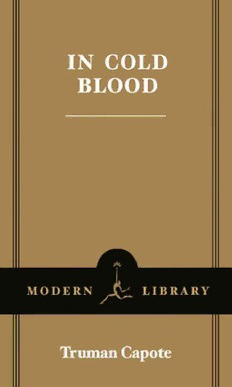
In Cold Blood PDF
Preview In Cold Blood
IN COLD BLOOD 10/3/01 11:15 AM Page 1 I C B N OLD LOOD This book has been optimized for viewing at a monitor setting of 1024 x 768 pixels. IN COLD BLOOD 10/3/01 11:15 AM Page 2 IN COLD BLOOD 10/3/01 11:15 AM Page 3 IN COLD BLOOD 10/3/01 11:15 AM Page 4 Biographical note copyright (c) 1992 by Random House,Inc. Copyright © 1965 by Truman Capote All rights reserved under International and Pan-American Copyright Conventions.Published in the United States by Random House,Inc., New York,and simultaneously in Canada by Random House of Canada Limited,Toronto. Modern Library is a registered trademark ofRandom House,Inc. The contents ofthis book appeared originally in The New Yorkerin slightly different form. All letters and quotations are reprinted with the permission oftheir authors. Grateful acknowledgment is made to The Rodeheaver Hall-Mack Co. for permission to reprint excerpts from “In the Garden”by C.Austin Miles.Words and music copyright The Rodeheaver Co.Copyright renewed.Reprinted by permission. LIBRARY OF CONGRESS CATALOGING-IN-PUBLICATION DATA Capote,Truman. In cold blood/Truman Capote p. cm. Originally published:New York:Random House,1966,© 1965. eISBN 1-58836-165-9 v1.0 1.Murder—Kansas—Case studies.I.Title HV6533.K3C3 1992 364.1’523’09781—dc20 92-50211 Modern Library website address: www.randomhouse.com/modernlibrary IN COLD BLOOD 10/3/01 11:15 AM Page 5 TRUMAN CAPOTE Truman Capote was born Truman Streckfus Persons on September 30, 1924, in New Orleans. His early years were affected by an unsettled fam- ily life. He was turned over to the care of his mother’s family in Monroeville, Alabama; his father was imprisoned for fraud; his parents divorced and then fought a bitter custody battle over Truman. Eventually he moved to New York City to live with his mother and her second hus- band, a Cuban businessman whose name he adopted.The young Capote got a job as a copyboy at The New Yorker in the early forties, but was fired for inadvertently offending Robert Frost. The publication of his early stories in Harper’s Bazaar established his literary reputation when he was in his twenties, and his novels Other Voices, Other Rooms (1948), a gothic coming-of- age story that Capote described as “an attempt to exorcise demons,” and The Grass Harp (1951), a gentler fantasy rooted in his Alabama years, con- solidated his precocious fame. From the start of his career Capote associated himself with a wide range of writers and artists, high-society figures, and international celebrities, gaining frequent media attention for his exuberant social life.He collected his stories in A Tree ofNight (1949) and published the novella Breakfast at IN COLD BLOOD 10/3/01 11:15 AM Page 6 Tiffany’s (1958), but devoted his energies increas- ingly to the stage—adapting The Grass Harp into a play and writing the musical House of Flowers (1954)—and to journalism, of which the earliest examples were Local Color (1950) and The Muses Are Heard (1956). He made a brief foray into the movies to write the screenplay for John Huston’s Beat the Devil (1954). Capote’s interest in the murder of a family in Kansas led to the prolonged investigation that pro- vided the basis for In Cold Blood (1966), his most successful and acclaimed book. By “treating a real event with fictional techniques,” Capote intended to create a new synthesis:something both “immac- ulately factual” and a work of art. However its genre was defined, from the moment it began to appear in serialized form in The New Yorker the book exerted a fascination among a wider reader- ship than Capote’s writing had ever attracted before. The abundantly publicized masked ball at the Plaza Hotel with which he celebrated the com- pletion of In Cold Blood was an iconic event of the 1960s, and for a time Capote was a constant pres- ence on television and in magazines, even trying his hand at movie acting in Murder by Death. He worked for many years on Answered Prayers, an ultimately unfinished novel that was intended to be the distillation of everything he had observed in his life among the rich and famous;an excerpt from it published in Esquire in 1975 appalled many of Capote’s wealthy friends for its revelation of inti- mate secrets, and he found himself excluded from the world he had once dominated. In his later years he published two collections of fiction and essays, IN COLD BLOOD 10/3/01 11:15 AM Page 7 The Dogs Bark (1973) and Music for Chameleons (1980). He died on August 25, 1984, after years of problems with drugs and alcohol. IN COLD BLOOD 10/3/01 11:15 AM Page 8 IN COLD BLOOD 10/3/01 11:15 AM Page 9 INTRODUCTION BY BOB COLACELLO In Cold Blood: A True Account of a Multiple Murder and Its Consequences riveted the nation’s attention when it was first published as a four-part series in The New Yorker in the fall of 1965 and then in book form by Random House in early 1966.I met Truman Capote several years later. Although Truman and I sometimes spent entire days together, he almost never mentioned the work that had brought him fame and fortune. Occasionally, he’d remark that Norman Mailer—who had published his tour de force of novelistic journalism, Armies of the Night, two years after In Cold Blood—was receiving far too much praise for exploiting the hybrid form Capote claimed he’d invented: the nonfiction novel. (“But no matter how hard Mr. Mailer tries,” he’d say,“he will never beat me at my own game.”) Capote’s early “fiction” novels—Other Voices, Other Rooms (1948), The Grass Harp (1951), and Breakfast at Tiffany’s (1958)—were gems of style, charm, and character. But it was only when he turned to journalism in The Muses Are Heard, his acutely observed, amusingly told 1956 report of a tour of Russia by a troupe of American actors per- forming Porgy and Bess,that his work became mod- ern. He later noted,“The Muses Are Heard” had set me thinking on a different line altogether: I wanted
